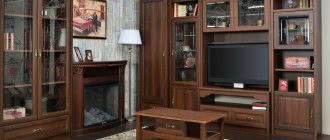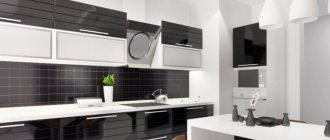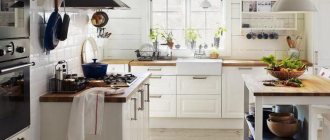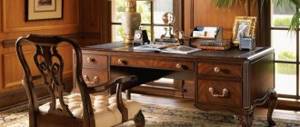Excursion into the history of the issue
In ancient times, the Chinese believed that the place where food was prepared was incredibly important to keeping the occupants of the house safe and healthy. Due to the importance of this room, special rules for arranging the kitchen according to Feng Shui were established.
Don't forget that the ancient Chinese cooked over an open fire. This meant that fire pits inside the cooking area had to be clean and safe, and starting and putting out fires required special techniques to maintain the health of the surrounding area. Some of the kitchen-related feng shui principles relate to these processes.
Modern kitchens do not have a fire pit, and therefore some of the feng shui rules associated with lighting a fire are no longer relevant. In fact, if we tried to apply all the rules of Feng Shui to our kitchens today, it would seem pointless and somewhat superstitious. However, some feng shui principles have stood the test of time and can (should!) be integrated into modern kitchen spaces to enhance the health and wealth of home owners.
Work area lighting
Successfully organized lighting of the work area in the kitchen can perform several functions: lighting and a night light. Lighting and illumination can be achieved using pendant lamps or pendant lamps. In this case, it is necessary to highlight the food preparation area especially brightly.
The light from the lamps should be neutral in relation to the natural color of the products from which food is prepared. But the place where you eat can be illuminated: the table setting and prepared food should look attractive and immediately arouse your appetite. You can use several lamps and lighting sources at once to illuminate the “guest area”. You can diversify the lighting of your work area not only by installing lamps in a traditional plasterboard box. These can be wall cabinets with LED lights built into them.
Linear LED luminaires of original design are designed for a diverse range of lighting tasks. European quality design and the ability to mount to flat surfaces make the LED luminaire profile a leader in the lighting segment. The simple process of installing LED equipment and the guarantee of energy savings will make you think or reconsider traditional approaches to lighting the kitchen work area.
Feng Shui kitchen colors. Rules
Each person reacts differently to different color combinations, so there is no one-size-fits-all approach to choosing a color palette for your kitchen. You should probably first of all focus on those colors that you like, that make you feel comfortable. However, here are some recommendations for choosing kitchen colors according to Feng Shui.
Blue
Blue is a complementary color to orange, which is well known to stimulate appetite. Unsurprisingly, blue has the opposite effect (some believe this is due to the fact that blue foods are rarely found in nature).
Using blue helps balance the energy of orange. But too much blue in the kitchen reduces the attractiveness of food: the effect produced may discourage novice cooks and those who like to cook for their loved ones.
Orange (and red)
Orange, like red, increases the attractiveness of food: a person in a kitchen painted in these colors begins to eat a lot and often. This may appeal to a novice cook who is trying to ensure that the dishes he prepares are to the taste of everyone.
However, using too much of the appetite-stimulating orange in the kitchen can cause you to overeat. If you do not want problems to arise, this color is best used in small doses.
Black
In kitchens designed according to Feng Shui rules, people try to avoid black because of the depressing effect of this color and its ability to visually compress the space. Black is very striking, but in the kitchen it can feel cold and isolated. In modern black and white kitchen interiors, it is recommended to add contrasting red accents, be it a towel, a kettle or even a bowl of red apples on the countertop.
However, Feng Shui still recommends avoiding a black and white color scheme. It's better to combine black with earthy tones - taupe, tan or even olive. This will reduce contrast and increase the warmth and friendliness of the kitchen space.
Soft yellow or gold
Along with earthy tones, soft, muted golds and yellows work great in the kitchen. They evoke a feeling of relaxation and comfort, a feeling of safety, security and happiness. These colors are associated with cheerful friendly gatherings and get-togethers, and this is what a dream kitchen should be like.
Like any other profession, the kitchen has its own rules and canons that must be followed. In the kitchen, concepts such as cooperation, mutual understanding, and support are also important. Chef's Academy team has prepared for you a list of the most important rules for working in the kitchen.
Organizing your workplace
As a cook, it is your responsibility to figure out where and how items are stored, how equipment works, who to contact for specific needs, and what the overall system of the kitchen is. This does not mean that after a couple of days in the kitchen, you should know absolutely everything; the main thing when starting work in a new kitchen is not to be afraid and do not hesitate to ask colleagues and managers. No question in the kitchen is stupid, it just may be asked at the wrong time and to the wrong person.
The best chefs always set up their work area so that access to pans, utensils, towels, wines to serve, plates, condiments and notes from the floor requires only a twist. Wasted steps wear out - plan to avoid them.
Personal tools, always remain personal
This is still one of the most important rules in the kitchen - a cook's or chef's personal tools are his personal tools. These tools allow the cook to remain at a certain level, he has his own history with these tools, they are considered components of his success. Often, if you touch another cook's tools, you will face the wrath of someone who acts as if you have inappropriately touched something intimate. Respect your colleagues' tools.
Own organization
Others in the kitchen will judge you on how organized you are, how your work is set up, and how well designed your workspace is. Everyone in the kitchen knows that unhappiness is the basis of success, and those who are not organized are not ready to learn and become successful in cooking.
Absolute purity
Efficient cooks work cleanly. You can look at a chef's work station and immediately know if they are capable of handling a busy night. Good cooks work cleanly, and they take pride in this fact. Every time there is a free minute, a good chef cleans his work area, wipes down the table, disinfects tools, changes aprons and conducts a visual inventory. Only clean, efficient cooks work and therefore they know how to remain calm during the busiest times of the shift.
Know your ingredients
The cook must know what ingredients he is working with. Know what they look like, where and how they are stored, what their purpose is, what their flavor profile is, how to determine the level of freshness. A professional chef must know how to tell the difference between a top round and a 109 rib. Research your kitchen's ingredients ahead of time, but make sure the information about the condition of your ingredients is accurate.
Understand cooking technologies
Of course, recipes are important and should be part of the system of working in the kitchen, but it is not so difficult to remember the cooking sequence and how to do it correctly. If you know how to braise, you can braise anything; if you can fry, you can fry anything; and if you know and understand cooking technologies, then you can be called a professional chef. In fact, there are a lot of cooking technologies and most likely you are familiar with the main ones, if not, then this article is for you.
Set your priorities right
As in life and in any profession, setting the right priorities is the key to human success. When given a series of tasks to complete, a competent cook begins by calculating the time required for each item or step. Create a priority sheet and then you will learn to be on time everywhere and not miss any details.
Respect others' workspace.
People in every situation need enough space to work, create and feel comfortable. The cook in the kitchen should know his place and not fill the common work space. If even one chef's workspace is disrupted, he becomes less efficient, and as a result, he does not have time to organize his workspace and disrupts the kitchen's operational processes. When the cook defines his work area, respect it and do not encroach on it.
Work fast, but don't sacrifice quality.
One of the most important skills in the kitchen is “sense of urgency.” There will always be too much work and too little time. The solution to this problem is to organize, prioritize and learn to work faster. At the same time, there can be no problem with the quality or acceptability of mediocre work. Cut faster; learning to multitask, work with lists, set goals, not fuss - this is what defines an effective chef today. Nine out of ten chefs will attest that one major disadvantage of culinary school graduates is that they don't know how to multi-task.
Always learn and don't be shy to take notes.
Keep a small notepad in your pocket. Write down everything you learn every day, take the time to do it. For example, how many eggplants does it take to make parmigiana for 150 guests? How much stock of caviar is required to prepare enough appetizers for 50 guests? What portion of salmon does the chef want? What is the shelf life of fresh round fish on ice? Of course, you also need to ask questions, but sooner or later you will become a universal warrior if you adhere to these rules and then your colleagues will also ask you, needing your advice. And don’t forget, the best way to improve your cooking skills is at Chef’s Academy – the best courses for professional chefs and more.
Kitchen design according to Feng Shui: practice
Cooking is an important element of human daily life. The correct approach to this process allows him and his family members to flourish in all areas of life. Cooking and cleaning up when finished are ways to demonstrate a person's desire to care not only for themselves, but also for those they love.
Tip: Pay attention to lighting
The kitchen, as a rule, is the next room in the house after the bathroom where a person goes in the morning after waking up, so it will be great if this space is as cheerful and sunny as possible. In fact, sunlight directly affects us by stimulating the production of serotonin and melatonin, thereby improving our mood.
Some kitchens boast an abundance of natural light. Other kitchens simply don't have this capability. In these cases, it would be beneficial to install a skylight or even a glass roof.
Tip: Make sure your kitchen utensils are functioning well
It seems obvious, but it is an important part of a well-functioning kitchen. Everything from properly sharpening kitchen knives to making sure kitchen cabinet doors and drawers close well work together for the benefit of the entire kitchen. Cracked mugs and cups should be replaced, and chipped paint touched up.
All this is very important for the kitchen. Ensuring the improvement of the kitchen from a Feng Shui point of view means that a person is able to take care of himself too.
Tip: Treat your stove with respect
As an important symbol of wealth in Feng Shui, the stove requires special respect. Keep it clean and in excellent technical condition. Use all the burners (burners) of the stove one at a time - this will help to evenly distribute the energy and bring positive qi into your space and life.
Tip: Hang a mirror above the stove
Of course, this advice doesn't apply to all kitchens, but if the space under your hood is dark, feng shui recommends hanging a mirror there to reflect the light and heat of the stove. It will be especially useful if the mirror also reflects the kitchen window, visually doubling it!
There is a myth that a feng shui mirror in the kitchen will double the wealth of your home, but don't hold your breath and expect it to magically happen. There is, however, another advantage of having a mirror behind the stove.
It consists in the fact that the person preparing the food will now be in the so-called “command position”, since he will be able to see what is happening behind him. This allows him to feel more comfortable, which from a Feng Shui point of view is favorable in any space.
Tip: Keep your kitchen clean
You may not know it, but Feng Shui places great importance on cleanliness, especially in areas that are directly related to health, including the kitchen. Keeping your kitchen clean involves more than just wiping down countertops once a day. Kitchen cabinets should also be cleaned regularly, both inside and out.
The same applies to household electrical appliances. Every day you need to wipe the kitchen apron, walls and countertops clean. Don't forget to sweep and mop the floor.
Tip: Keep your kitchen tidy
There is a clear distinction between a clean space and a space free of clutter, although sometimes the two concepts are combined into one overall entity. Kitchen countertops tend to accumulate on their surface all sorts of elements of a busy home life - mail, brochures, homework notebooks, store receipts, etc. can quickly take up the space needed for cooking.
A good rule of thumb is to only keep items on your countertop that are used frequently (daily or at least three times a week). Anything else will look like clutter and should therefore be stored in a closet or closet.
Tip: Keep knives out of sight
According to Feng Shui, knives make people feel at best uncomfortable, and at worst threatened and vulnerable. And although it is currently popular to store knives along the wall on a magnetic strip or in a special wooden block, Feng Shui recommends keeping them out of sight, for example, storing them in a desk drawer. Among other things, it is also safer.
Tip: Don't forget about wooden elements
In modern kitchens, you can easily find fire (stove), water (sink), metal (kitchenware and appliances) and earth (color). It remains to introduce the fifth element – wood. It's easy, you don't have to replace your cabinets with wood ones or anything like that.
Incorporating wood into your kitchen interior is quite simple. You can, for example, place the fruit in a wooden bowl, place a wooden cutting board or knife block in a visible place (if, despite our previous advice, you still use it). Even a small potted plant or just a picture of a plant can easily play this role.
Tip: Keep only what you actually use in your kitchen.
A general rule of thumb widely used in feng shui is to only keep things that you need and/or love. (Many interior designers use this rule in their work, regardless of whether they adhere to the principles of Feng Shui or not.)
As you regularly clean your kitchen, removing items from cabinets and drawers to wipe them down, constantly evaluate whether you are using the item and whether it is really worth continuing to store it in that cabinet. Rarely used items can and should be moved to less accessible storage areas (such as the top shelves of the pantry) or thrown out altogether.
While cleaning, you can also organize your kitchen utensils properly. Your kitchen will become more convenient and your cooking work more efficient if, for example, you place the toaster next to the bread rack and the baking dish next to the measuring cups and spoons.
Tip: Use large kitchen spaces for eating
If your kitchen has a large area, you can also place a dining area here. In this case, you are likely to find that the best energy flows inside the kitchen. The dining room serves an important purpose in Feng Shui, and the same purpose can be achieved in the kitchen, provided the latter is large enough to accommodate a separate eating area that has been prepared nearby.
Tip: Avoid large objects overhead
Some modern kitchens have pots and pans hanging from the ceiling, and this has already become a popular design trend. Of course, copper utensils are visually quite attractive and give the kitchen a real country house feel, but from a feng shui perspective it's not a good thing because heavy objects placed overhead tend to make us feel unsafe.
In a Feng Shui-designed kitchen, large pots, pans, and other large, heavy items are kept out of sight in pantries or kitchen cabinets.
If you notice an error, a non-working video or link, please select a piece of text and press Ctrl+Enter .
No budget? Improvise
As a last resort, you can simply buy a comfortable chair, place your laptop on the dining table, and work there. The main thing is that you feel comfortable. And a multicooker can handle breakfast, lunch and dinner perfectly.
If you want to place your office in another room, pay attention to 14 ideas that will help you create a comfortable workspace for a freelancer
Did you like the article? Then support us, click
:
When trying to incorporate a desk into your kitchen, it can be difficult to find a suitable location for it. It is also extremely difficult to fit this piece of furniture into the interior in such a way that it not only does not stand out from the general concept, but also emphasizes it favorably.
Most often, the workspace is a certain area where a desk is combined with kitchen cabinets, pencil cases, and hanging storage systems. As a result, this corner absolutely does not fit into the overall ensemble. However, there are several ways to avoid foreignness and successfully introduce a cabinet into the kitchen.











